
Promoting Your Book on Amazon
Authors must take advantage of every tool possible to help promote their work online. Look at what Amazon Author Central is, what it offers and how you can set it up.
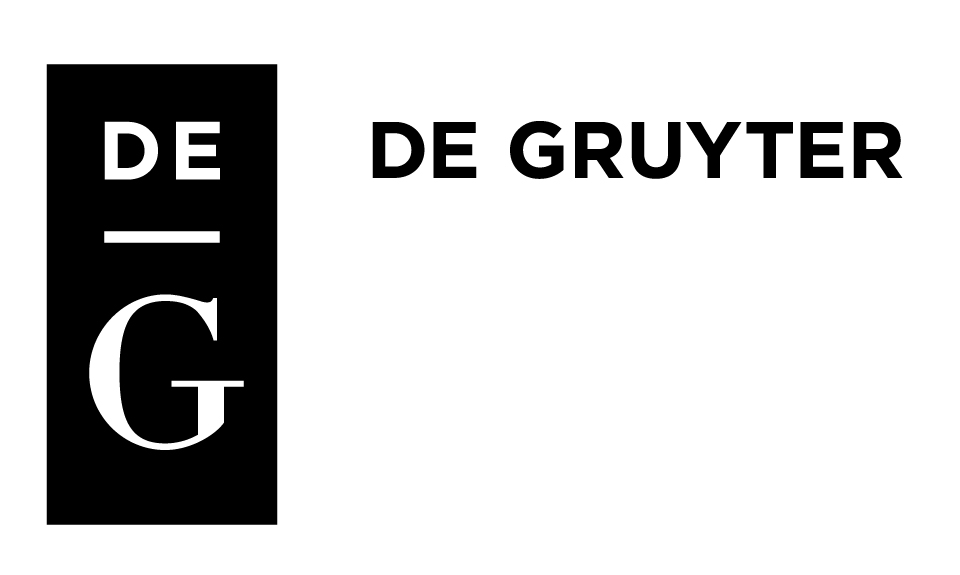
Promoting Your Work on Social Media
With the volumes of content being produced today, it can be difficult to get noticed. This is why we’ve put together this guide so you can learn how to use social media promotion to grow and connect with your audience. We have compiled some tips and samples to show how some of our authors effectively use channels such as Twitter, LinkedIn, Facebook, and more to promote their writing.
While social media platforms may not appear to be a suitable space for academics at first, they are great spaces for people to meet and discuss the fields they are involved in, be it for research or teaching purposes. Academics can join in discussions on a variety of topics in many different areas of research and teaching, making them an invaluable way to connect with peers and mentors across the world.
Online social platforms are a great way to promote the release of your new book. They offer numerous benefits that you may not get through traditional promotional channels. Here are some of the key advantages of promotion on social networks:
Social networking platforms are popular ways for people to connect with friends, family, and those with similar interests, as well as institutions, thought leaders, academics and peers.. This makes them an ideal way for you to connect with those who are interested in your work, whether it’s to promote a new book or simply to engage and develop deeper connections with your readers.
You probably already know that you can use social networks to exchange information with peers that’s important to the quality of your work. But key individuals on social networking sites may also play an important part in helping you reach their connections and audiences. Thought leaders and academic researchers on social networks can help you promote your book by reaching a broader audience who may be interested in it.
Social platforms are designed to be easy to use, making them a great way to grow an audience and share the news about the release of your new book with thousands of people online.
Social networks are free to use, which means you can promote the release of your new book without paying a cent. However, many of these online community platforms also have paid promotional tools, which can help you reach even more specific audiences if you are prepared to pay for them.
Not only are social media platforms great for promotion, they can also boost your discoverability. Due to the popularity of social media sites, search results from these sites will be highly ranked. By having a page or profile on one of these sites, you can dramatically increase the discoverability of your work when you share information about it to the social media platform.
Now that you know about the benefits of using these platforms, the question arises: “Which social media platform should I use?” While an author can promote their work on any social network, there are so many that you may be wondering where to start or which may be most appropriate for promoting the release of your book. Here are some of the best online community platforms that you can use to get the word out and information on how to promote your books on each of these platforms.
According to market and consumer data site Statista, Facebook has almost 3 billion active monthly users. The sheer size and reach of this platform make it an incredible place to help connect with people who may be interested in reading your work.
You can reach people via one of two ways:
Your personal Facebook profile – People who are interested in your work can add you as a friend on Facebook or follow you to get the latest updates if you have your privacy settings configured to allow people to view your updates. While this is undoubtedly the easiest choice, you may want to keep your personal profile separate from your work life. Thankfully, the second option allows you to create a page specifically for your work.
A dedicated author page – The Facebook platform allows you to create your own dedicated author page so that you can post information and updates in written, picture, or video format, specifically on the work that you produce.
There are also other tools on Facebook that you may find useful for promoting your work, including Facebook Live for live-streaming videos and Facebook groups such as fan groups or groups who are interested in the topic that your book covers. There are also analytics tools so you can improve your understanding of how readers engage with your online persona on Facebook.
Before you dive into the world of Facebook promotion, here are a few quick pointers:
Keep your specific audience in mind
Write posts that are short, sweet, and to the point
Make sure posts include an element of your personality, including humour, if it suits the tone of a post
Provide fun, personal, interesting, or useful content in your posts
Keep your posts mobile-friendly, as most Facebook users access the platform from a mobile device.
Talk only about yourself or your work
Ignore negative feedback – post a response
Respond negatively to people who criticise you or your work
Post during off-peak hours (such as late at night)
Use hashtags as they don’t work on Facebook.
When using Facebook to promote your book, you need to ensure that you have a description of yourself as an author in your bio and that you have links to your book on your Facebook page. It’s also useful to post engaging content that resonates with your readers (such as a sample page or chapter of the book you’re promoting or an image of the cover of the book). Your posts and Facebook page should make it easy to buy your book once it is released.
While LinkedIn may have originally started as a site for building publicly accessible work-related online profiles, it has evolved over time to become a place where industry professionals connect and share information related to their industry. Today, it has more than 800 million registered users (according to data site DataReportal), making it a great way to promote your book to people in your industry.
The LinkedIn platform offers a variety of options to help you better connect with a potential audience:
Add “author” as your headline
List the books you’ve written in your LinkedIn summary
Share any positive media coverage of your books
Ask people to share their thoughts on your book on available sites (such as Amazon) or book-review sites
Add a cover image of your work to your LinkedIn profile to promote it.
These are some of the main ways to help you grow on LinkedIn, but there are other things you can do to help you reach your potential audience.
To ensure you avoid any LinkedIn etiquette blunders, here are some rules of thumb to help you get the most out of your profile:
Share interesting content via status updates
Help colleagues and friends by endorsing their skills
List your publications and skills
Congratulate your contacts on new jobs or other positive news
Join a LinkedIn group that is relevant to your work and connect with your peers.
Randomly add people you haven’t met
Only reach out to people when you need help
Use an informal or poorly composed picture as your profile image
Be inactive
Use unnecessary jargon in your profile or posts.
In regards to the promotion of your book, you need to ensure your posts about your book are more informative and less “hard sell”. That means creating engaging content about your book and encouraging readers to ask questions about it. You can add testimonials so that readers will have greater trust in your product, use the image header on your profile to promote your latest release and ensure it is easy for users to buy your book once they engage with your content using links in your posts.
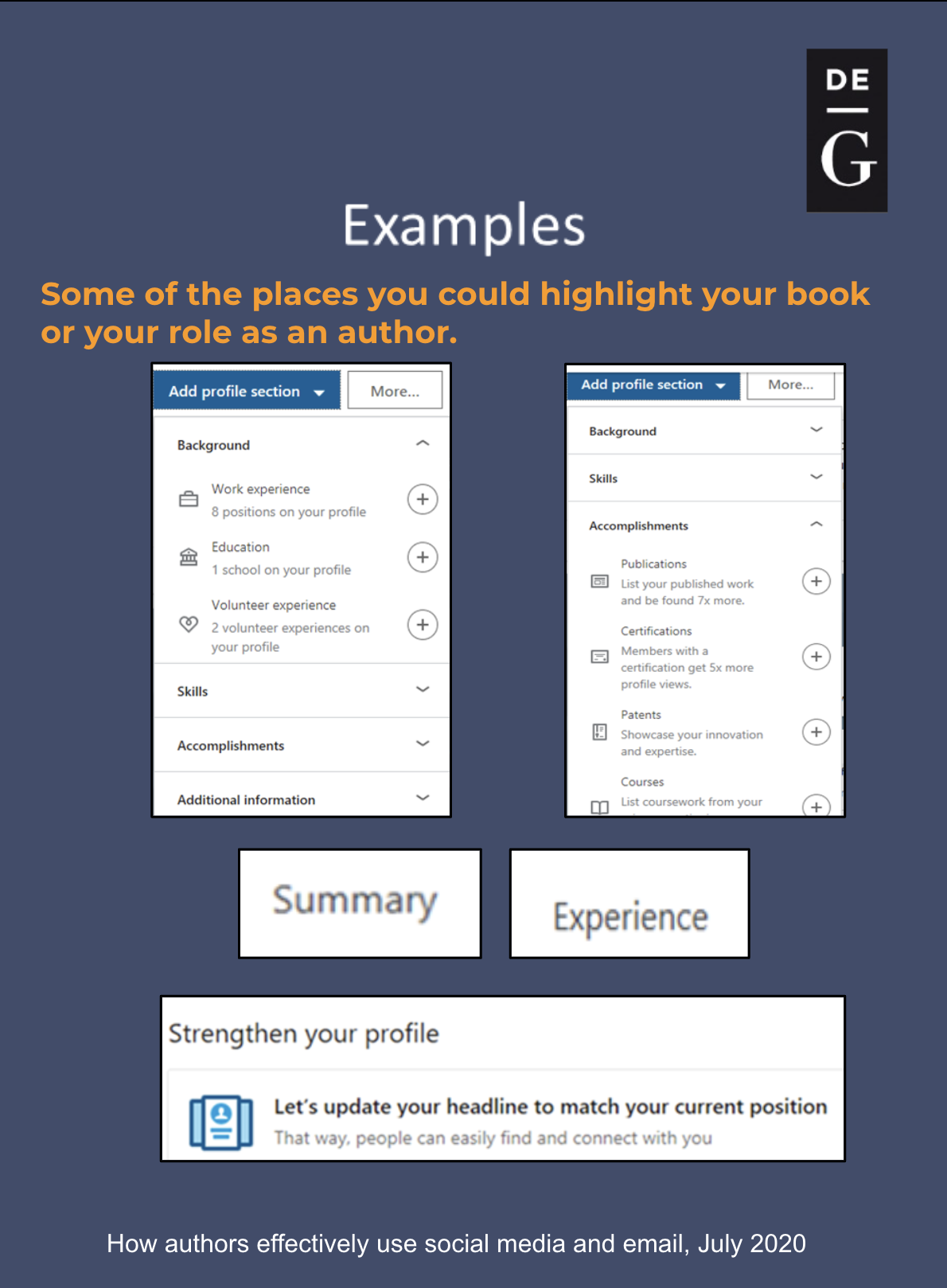
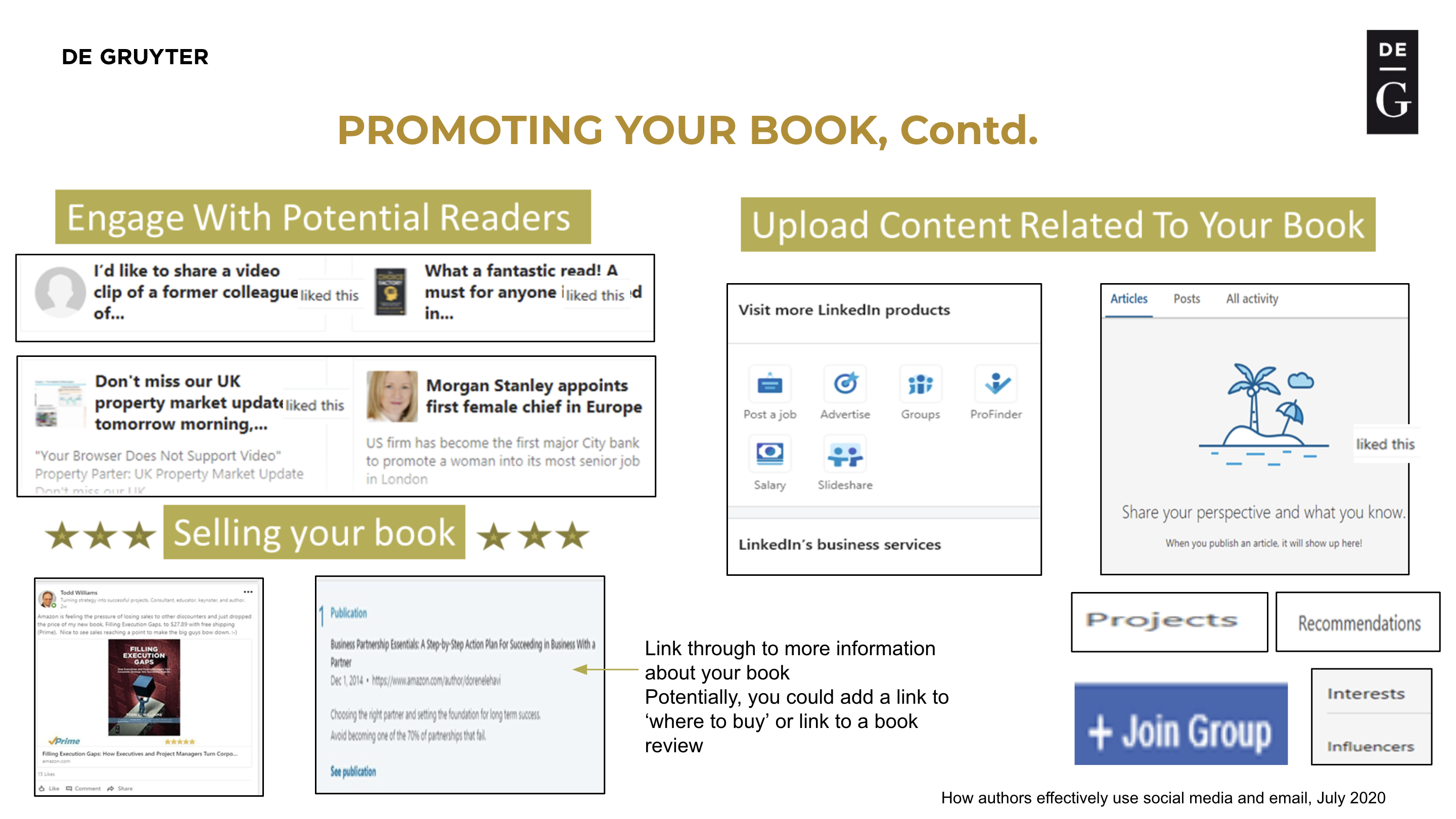
Twitter is a short-form platform best used for casual messaging and posts. The 280-character limit on posts highlights how this channel is designed for quick and easy-to-consume content. With almost 230 million daily active users (according to Statista), Twitter offers a lot of potential to grow an active and engaged audience.
You can help nurture your audience and connect with people using:
As with every other social network, there are things you should and shouldn’t do when engaging with people:
Install the Twitter app on your phone so you can tweet from anywhere
Post information that’s useful or entertaining for your followers
Reply to other people’s posts or mention them so they know you’re talking to, or about, them
Take advantage of relevant hashtags so that your messages and content are included in the search results for similar content (this is particularly important for conferences or other events).
Just talk about yourself or your work
Overuse hashtags, particularly if they are not related to the subject matter of your post
Try to fill out all 280 characters if you can make your post shorter
Follow random people or try to boost your followers through paid services
Share or discuss any content that you wouldn’t share in a work environment as most of the content on Twitter is publicly accessible.
Twitter is a more informal platform where it’s not unusual for brands to engage in casual banter. You should keep your promotional book posts on the lighter side to properly connect with Twitter users. Consider sharing photos and videos of the book or events related to the book, such as the book cover or the launch party. Again, post content that includes questions to encourage engagement from your audience, and don’t forget to include accessible links so people can easily see how to buy your book.
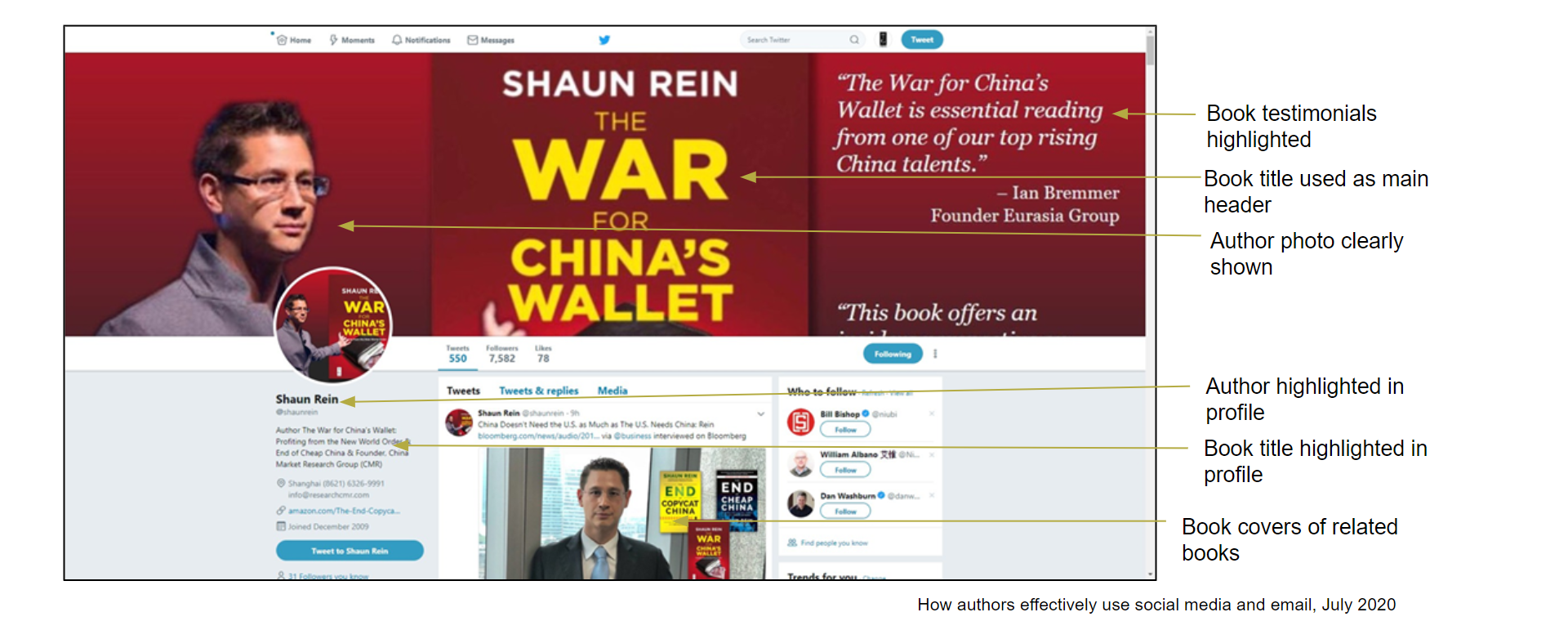
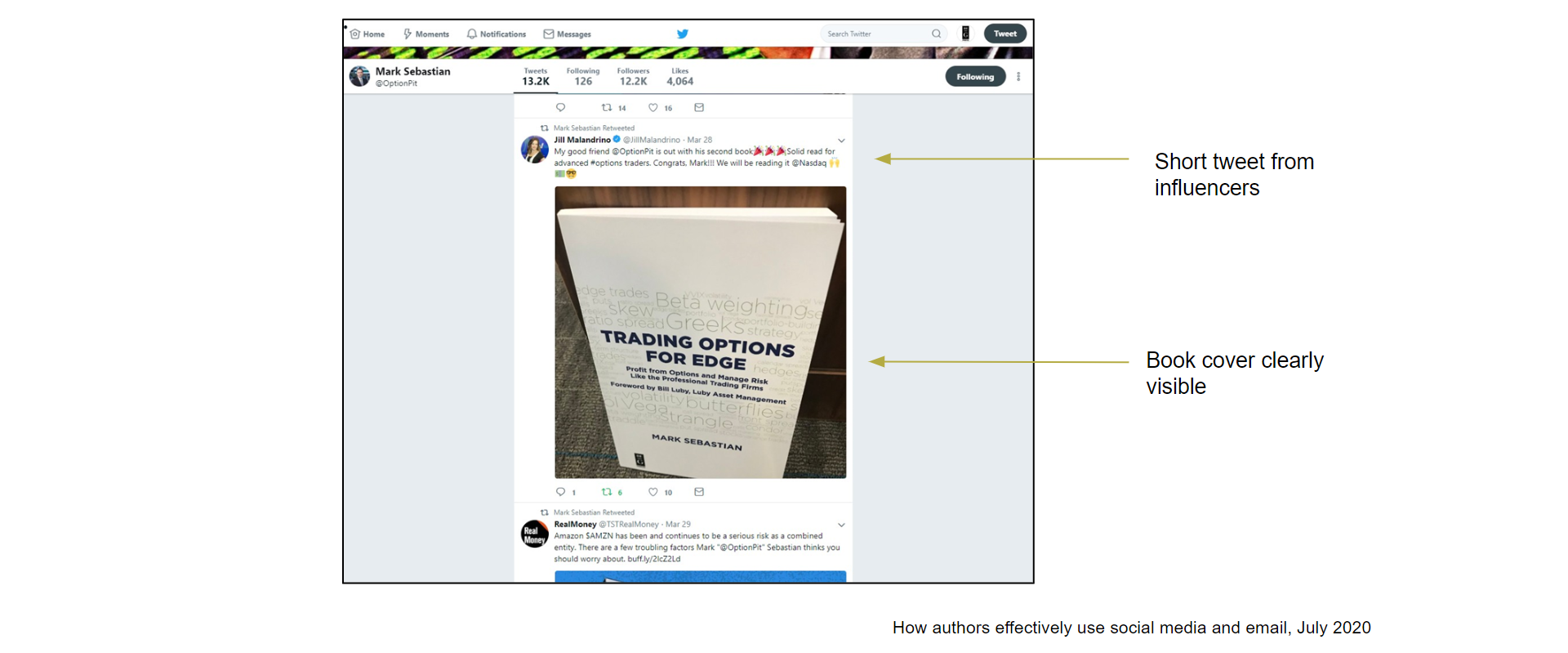
This may be a lot of information to authors who are new to the social media space, but here are a few points to keep in mind:
There's no best social media platform for you to promote your book
You don't need to be on all channels and you most probably won't have the time to do so
You may find different platforms suit your personality, the type of books they write, and the audience you are interested in reaching more than others.
While this is just a short guide to three of the major social networks, you’ll no doubt find that much of this information can be applied to other social platforms. We hope this information helps you reach your audience and gets your book into the hands of thousands of readers around the world. If you’d like assistance with promoting your book, visit the For book authors section for more ideas.